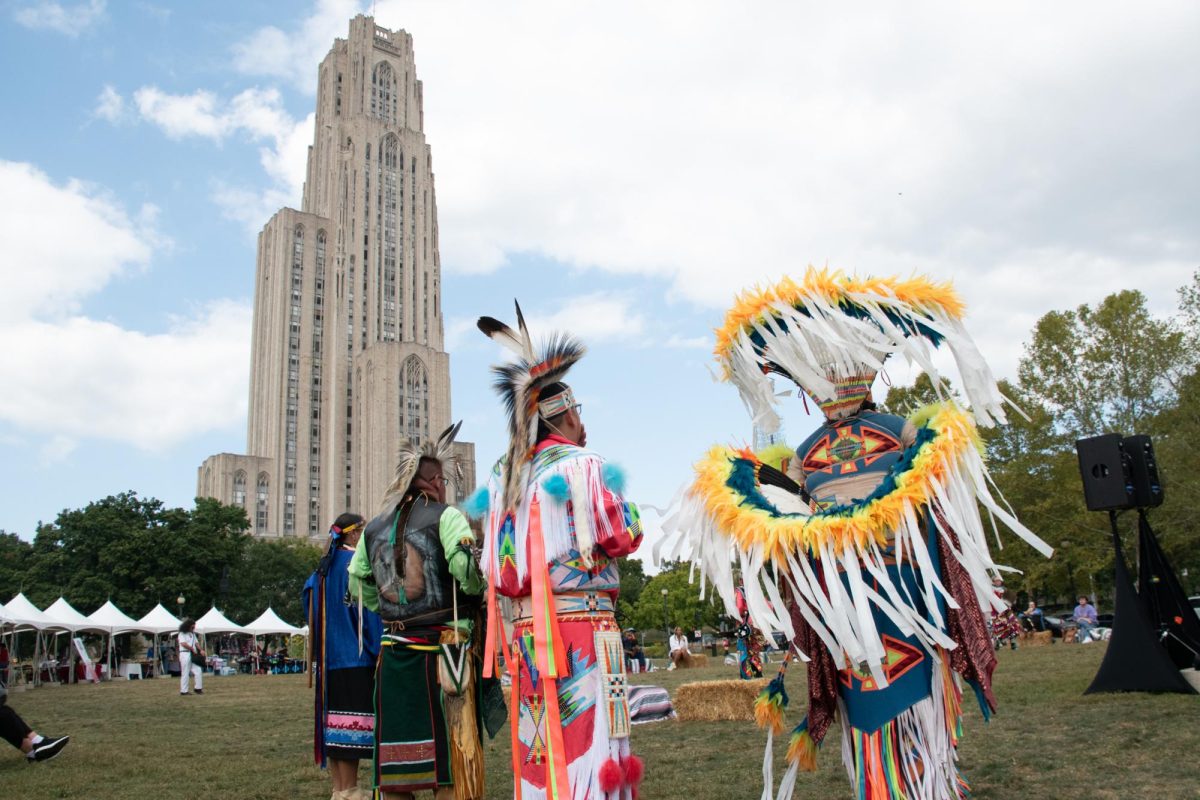Wearing colorful, traditional regalia, members of the Indigenous community and Council of Three Rivers American Indian Center (COTRAIC) gathered in Schenley Plaza on Wednesday for the second annual Mini Pow Wow.
Tessa Provins is an associate professor of political science at Pitt, a member of the Choctaw nation and a co-chair of Pitt’s Indigenous Cultural Festival. Provins said she feels events like the Mini Pow Wow are vital.
“When I came to Pitt five years ago, there was almost no work being done on the service side, event side, research side or the teaching side for Indigenous people,” Provins said. “This event and all of the people that are involved in this and all of the organizations around Pitt that have gotten excited and supported is sort of the first step in having an identity that’s shown meeting at a place previously didn’t have even a couple of years ago.”
Mike Simms is a member of the Seminole tribe and a main organizer of the COTRAIC Annual Pow Wow, which is on Saturday, Sept. 23 and Sunday, Sept. 24. He described the significance of powwows across the country.
“Our powwows are gatherings, like a Native American festival,” Simms said. “It’s our chance to see old friends, catch up with friends, make new friends — a lot of our powwows are coast to coast. There are also competition powwows, so we’re actually out there competing for prize money against each other. You can find a powwow somewhere in every single state.”
Chanel Wissner, a Pitt alumna and member of the Tuscarora people, said she appreciates the historical value of Pitt’s Mini Pow Wow.
“My favorite part about the powwow today is the location,” Wissner said. “I have a strong family history here in Pittsburgh, but also because of the historic value that the city of Pittsburgh and Pennsylvania had with the Indigenous community, so it’s just nice to come here and share our culture and take in the nostalgia.”
Simms said she enjoys seeing the powwow progress over the years.
“My dad is the executive director for the American Indian Center here in Pittsburgh,” Simms said. “I’ve been part of this since the day I was born. And I’ve now run and coordinated the Pow Wow for the last 14 years. And I plan to continue to do so for many, many more years to come. It’s a history, and seeing where it was and how it’s grown is very important to me, because I just want to see us continue to grow forward and not go backwards with it.”
Provins believes the goal of Wednesday’s powwow is to educate people, but also to have fun.
“Most people think that Indigenous people are oftentimes like these canonical things, that we live in teepees and ride horseback,” Provins said. “This is a real opportunity for the students here and staff and faculty to get exposed to native culture. But also to see that Indigenous people are contemporary and we’re here. This means that today is really about having fun and education.”
Wissner and Simms feel it’s important to share their culture because the media shows false stereotypes about Indigenous people.
“Today, I know the University of Pittsburgh with Tessa and Mike Sims came together to give a showcase for a platform so that we can kind of share our culture with everyone, ” Wissner said. “Because, you know, we’re here. We’re still very vibrant. We’re still very active. It’s just that people might not see us, because we’re not in the Hollywood stereotype. So it’s nice to kind of break that mold in sharing culture.”
Wissner said Pennsylvania has maintained a good relationship with the Indigenous community throughout the state.
“Pennsylvania has always had a very close relationship with the tribes around here,” Wissner said. “It’s also one of the reasons why Pennsylvania was one of the first states and colonies to abolish slavery, because a lot of the tribes around here didn’t like slavery. The tribes were very influential.”
Simms said though the Indigenous community in Pittsburgh has gotten smaller over time, it is still present.
“The community has gotten smaller, but we’re still strong,” Simms said. “We’ve gotten smaller from people moving out of the area and moving on with life, and some kids don’t continue to fall in their parents footsteps and be part of the community at [the] Indian Center, which is okay, but we still have a strong community now and we’re working on rebuilding a lot of the roots where we came from.”
Wissner said she appreciates the positive influence that COTRAIC has had on her throughout her life.
“We joined the Council in the ‘90s,” Wissner said. “I was a teenager at the time, so it was cool to be around the elders, hear stories and learn traditions. My family moved back to Pittsburgh in 2011 and I felt the need to kind of take over the community days and help bring those back. We do a lot to make sure that both the children and the elders have a place to come and socialize, because a sense of community is really important.”
Provins discussed the importance and significance of opening up the powwow to people outside the community, including on Pitt’s campus.
“This is in the center of Pittsburgh,” Provins said. “The University of Pittsburgh is a public-facing university. Why would we make this exclusive to Pitt? We’re in a public park and Schenley Plaza. We have tons of people who have an opportunity to connect with the community and to share this event with them.”



